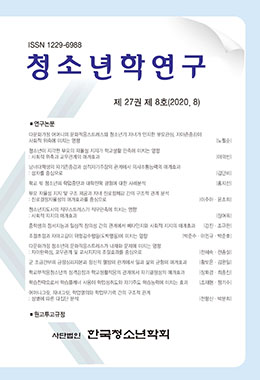본 연구에서는 Adler의 공동체감 이론을 토대로 청소년기 자아존중감, 또래 애착, 지역사회인식이 공동체 의식을 매개로 삶의 만족에 영향을 미치는 인과적 모형을 설정하고, 공동체 의식의 매개효과를 검증하였다. 이를 위해 한국아동·청소년패널조사 2010의 중1 코호트 7차 자료를 사용하였고, 만 18세에서 19세의 청소년 1,881명의 자료를 구조방정식모형을 사용하여 분석하였다. 분석 결과 자아존중감, 또래애착, 지역사회인식 모두 공동체 의식을 부분 매개하여 삶의 만족에 정적인 영향을 미치는 것으로 나타났다. 자아존중감은 삶의 만족에 있어 가장 큰 직접적·간접적 영향을 미치는 것으로 나타났고, 또래애착과 지역사회인식은 유사한 크기로 자아존중감에 비해 공동체 의식에 더 큰 영향을 미치는 것으로 나타났다. 본 연구 결과를 바탕으로 논의와 시사점, 연구의 제한점과 후속 연구에 대한 제언을 기술하였다.
In the present study, based on Adler's sense of community theory, a causal model in which adolescent self-esteem, peer attachment, and community perceptions influence life satisfaction through a sense of community was established, and the mediating effect of a sense of community was verified. For this purpose, the 7th data from the 1st cohort of the Korean Child and Youth Panel Survey 2010 was used, and the data of 1881 youth aged 18 to 19 were analyzed using a structural equation model. Results showed that self-esteem, peer attachment, and community perceptions all had positive effects on life satisfaction by partially mediating the sense of community. Self-esteem was found to have the greatest direct and indirect effects on life satisfaction, and peer attachment and community perceptions had a similar size and had a greater effect on a sense of community than self-esteem. Based on the results of the present study, implications, limitations, and suggestions for further research were discussed.




